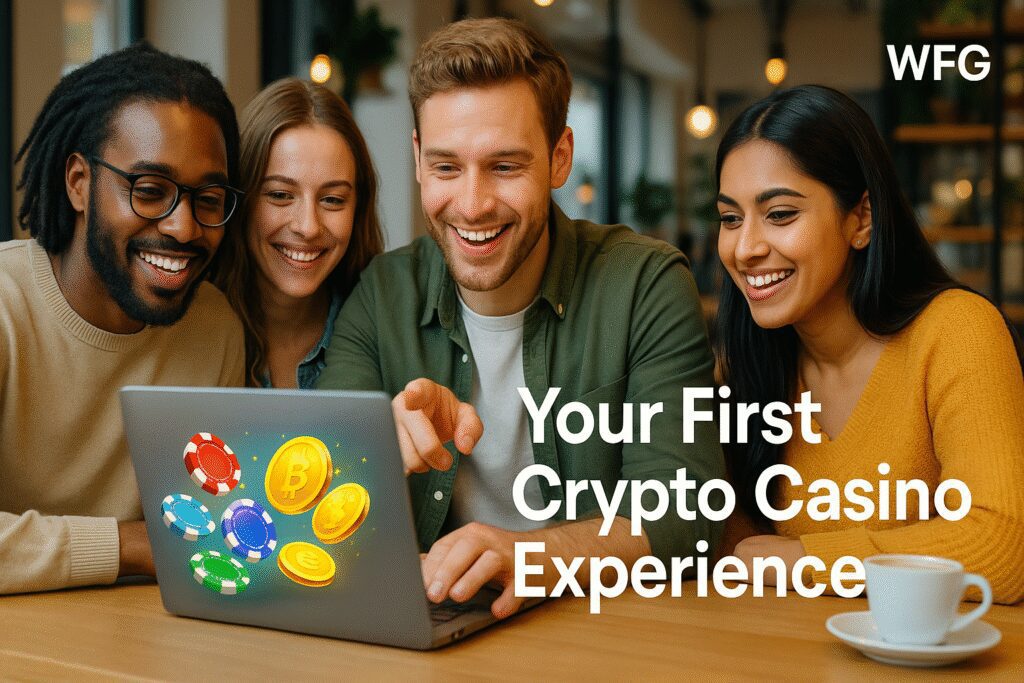Best crypto casino online platforms are revolutionizing gambling, but if you’re new to blockchain technology, the whole concept might feel like learning a foreign language while blindfolded. Here’s the truth: you don’t need to become a cryptocurrency expert to enjoy the benefits of crypto casinos. You just need someone to explain it without the tech jargon, which is exactly what we’re about to do.
Think of this guide as your translator, turning complex blockchain concepts into plain English while showing you exactly how to find and use the best crypto casino online for your needs. We’ll walk through everything together, from understanding what makes these casinos special to making your first deposit without breaking a sweat.
What Makes a Crypto Casino Different from Regular Online Casinos
The fundamental difference between crypto casinos and traditional online casinos isn’t as complicated as the marketing makes it seem. Traditional online casinos work like digital versions of Vegas casinos—you deposit money from your bank, play games, and withdraw back to your bank. Crypto casinos simply replace your bank with digital currency, but the gambling experience remains familiar.
Cash Earning Game Apps: How Crypto Gamers Turn Play Into Profit
What changes dramatically is the speed and freedom you experience. While traditional casinos might take 3-5 business days to process withdrawals, crypto casinos often complete transactions in under an hour. Your bank can’t block transactions, you don’t need to share sensitive financial information, and geographical restrictions largely disappear.

The popularity surge isn’t just hype either. Last year alone, crypto gambling grew by 204%, and it’s not because everyone suddenly became blockchain enthusiasts. Players discovered they could claim bigger bonuses, access games from anywhere, and actually receive their winnings the same day they won them. These aren’t theoretical advantages—they’re practical benefits you’ll notice from your very first session.
Understanding Cryptocurrency for Casino Gaming (No Tech Degree Required)
Cryptocurrency for casino gaming works like casino chips, except these chips work at thousands of casinos worldwide and hold their value outside the casino too. When you buy cryptocurrency to gamble with, you’re essentially buying universal casino chips that no single company or government controls.
The only three cryptocurrencies beginners really need to know are Bitcoin, Ethereum, and USDT (Tether). Bitcoin is like the hundred-dollar bill of crypto—widely accepted but sometimes overkill for small bets. Ethereum works like twenty-dollar bills—flexible and fast. USDT acts like regular dollars in digital form, maintaining a stable value so you always know exactly how much you’re betting.
Digital money in online casinos functions through something called a wallet, but forget the technical definition. Your crypto wallet is simply your account number and password combined into one. When you want to play, you send cryptocurrency from your wallet to the casino’s wallet, just like sending an email with money attached. The casino credits your account instantly, and you’re ready to play.
How to Start Playing at the Best Crypto Casino Online
Getting your first cryptocurrency feels intimidating until you realize it’s actually easier than setting up a Netflix account. Most crypto casinos now let you buy cryptocurrency directly on their site using your credit card. You click “deposit,” choose “buy crypto,” enter your card details, and within minutes you have cryptocurrency in your casino account.
Making your first deposit follows three simple steps that take about two minutes total. First, you copy the casino’s wallet address (think of it as their account number). Second, you paste this address into your wallet or exchange app. Third, you enter the amount and hit send. The casino receives your deposit almost instantly, though some wait for a few confirmations—usually 10-15 minutes maximum.
When you win and want to cash out, the process reverses just as simply. You provide your wallet address to the casino, request the withdrawal amount, and receive your winnings directly. No forms, no waiting for approval from your bank, no questions about why you’re receiving money from an online casino. The money arrives in your wallet, and from there you can convert it back to regular currency whenever you choose.
The Top 5 Beginner-Friendly Crypto Casinos for 2025
The best crypto casino online for beginners isn’t necessarily the one with the most games or biggest bonuses—it’s the one that makes your first experience smooth and enjoyable. After testing dozens of platforms with beginners in mind, five casinos consistently deliver exceptional experiences for newcomers.
BC.Game stands out for its tutorial system that actually teaches you while you play. Every feature includes a question mark icon that explains things in plain English. They offer a no-deposit bonus so you can practice without risking anything, and their support team specializes in helping beginners. The downside? Their game selection might overwhelm you initially with over 8,000 options.
Stake.com excels at simplifying the complex. Their interface looks like a regular online casino, hiding all the crypto complexity behind the scenes. They accept credit card crypto purchases directly, and their mobile app works flawlessly. However, they require email verification, which some players wanting complete anonymity might not appreciate.
CloudBet focuses on sports betting alongside casino games, perfect if you want variety. They’ve been around since 2013, making them one of the most established crypto casinos. Their welcome bonus is straightforward without confusing terms. The drawback is their slightly higher minimum deposits compared to newer platforms.
FortuneJack offers the best educational resources, including video tutorials and a comprehensive FAQ section written for beginners. They support the widest range of cryptocurrencies if you want to experiment. Their only weakness is slower withdrawal times during peak hours.
mBit Casino keeps everything simple with a traditional casino layout that feels familiar. They offer 24/7 live chat support with agents who patiently explain crypto concepts. Their game library is smaller but carefully curated for quality. The main limitation is fewer cryptocurrency options compared to competitors.
Essential Features Every Best Crypto Casino Online Should Have
Security features that actually matter for beginners aren’t about complex encryption protocols or blockchain technology—they’re about practical protections you can understand and verify. Look for casinos displaying their license prominently, offering two-factor authentication, and maintaining a public record of big wins and payouts. These visible security measures matter more than technical specifications you can’t verify yourself.
Bonuses at crypto casinos often seem too good to be true because they’re calculated in dollars but paid in fluctuating cryptocurrency. A legitimate beginner-friendly bonus clearly states wagering requirements (aim for 35x or lower), doesn’t expire in just a few days, and applies to games you actually want to play. Avoid bonuses requiring deposits in specific cryptocurrencies you don’t understand.
Game variety means nothing if the games don’t work properly or feel unfair. Start with established providers like Evolution Gaming for live casino games or Pragmatic Play for slots. These companies stake their reputations on fair play and smooth performance. The best crypto casino online offers demo modes so you can try games without risking money while learning.
Customer support that speaks plain English becomes crucial when you’re learning. Test the support team with a simple question before depositing. If they respond with technical jargon or seem impatient with basic questions, find another casino. Quality support teams understand that today’s beginner becomes tomorrow’s high roller.
Common Crypto Casino Mistakes Beginners Make (And How to Avoid Them)
The wallet confusion strikes almost every beginner because crypto casinos use the term differently than you’d expect. Your casino wallet isn’t the same as your personal crypto wallet. The casino wallet is just your account balance at that specific casino. Your personal wallet is where you store cryptocurrency you own. Never leave large amounts in casino wallets long-term—withdraw winnings to your personal wallet regularly.
Understanding wagering requirements on crypto bonuses prevents devastating disappointment. That 5 Bitcoin bonus might require you to bet 40 times the bonus amount before withdrawing. Calculate this in dollar terms: if Bitcoin is worth $50,000, you’d need to wager $10 million before claiming that bonus. Always convert bonus amounts to dollars and calculate wagering requirements before accepting.
Transaction fees matter more than you’d think, especially for smaller players. Sending $50 worth of Bitcoin might cost $20 in network fees during busy periods. Smart beginners use cryptocurrencies with lower fees like Litecoin or USDT for smaller deposits. Check current network fees before choosing which cryptocurrency to use—this information is freely available on sites.
Is Crypto Gambling Legal and Safe?
The legal landscape for crypto gambling seems complex but actually follows simple logic. If online gambling is legal in your jurisdiction, crypto gambling typically falls under the same regulations. Countries like the United Kingdom, Malta, and Canada treat crypto casinos identically to traditional online casinos. The gray area exists in countries where online gambling laws haven’t been updated to address cryptocurrency specifically.
Verifying a crypto casino’s legitimacy takes five minutes of research that could save you thousands. Check if they hold a license from Curacao, Malta, or Gibraltar—these jurisdictions actually enforce standards. Search the casino name plus “scam” or “not paying” to find recent complaints.
Red flags that should make you run include promises of guaranteed wins, bonuses exceeding 500% (they’re always impossibly restricted), no clear licensing information, and pressure to deposit immediately. Also avoid casinos that only accept obscure cryptocurrencies, claim to be “completely unregulated,” or have websites full of spelling errors and broken English.
Your First Week at a Crypto Casino: What to Expect
Day one at your chosen crypto casino should focus on exploration, not profit. Deposit a small amount you’re comfortable losing—think of it as entertainment expense like going to the movies. Try different game types using minimum bets to understand how each works. Don’t chase losses or expect to win big immediately.
Days two through four are for finding your rhythm. You’ll discover which games you enjoy versus which stress you out. Slots might seem appealing, but table games often offer better odds. Live dealer games provide the most authentic experience but require larger minimum bets. Use this time to understand the casino’s interface, where to find game rules, and how to track your balance.
Turn Your Gaming Skills into Cash: The Ultimate Guide to Playing Games for Real Money in 2025
By day seven, you’ll feel comfortable enough to develop preferences and strategies. You’ll understand how bonuses actually work, which games suit your style, and whether crypto gambling fits your entertainment budget. Most importantly, you’ll realize the technology isn’t scary—it’s just a tool that makes gambling more convenient and accessible.
Frequently Asked Questions About Crypto Casinos
Can I still use regular money at crypto casinos? Many crypto casinos operate as hybrid platforms, accepting both cryptocurrency and traditional payment methods. However, the best bonuses and fastest withdrawals typically require cryptocurrency use. Some casinos let you deposit via credit card, automatically converting your payment to cryptocurrency for playing.
Do I need to understand blockchain to play? No, you need to understand blockchain about as much as you need to understand internet protocols to send email. The technology works behind the scenes while you focus on playing. Most players never learn the technical details and still enjoy years of problem-free gambling.
What happens if I lose my crypto wallet password? Losing your personal wallet password means losing access to those funds permanently—there’s no password reset option. However, casino account passwords can be reset normally. This is why beginners should start with small amounts and write down wallet passwords in multiple secure locations.
How long do crypto casino withdrawals really take? Bitcoin withdrawals typically complete within 10-60 minutes. Ethereum takes 5-20 minutes. USDT on certain networks processes in under 5 minutes. Compare this to traditional casinos where withdrawals take 2-7 business days, and you understand why players switch to crypto.
Are crypto casino games rigged? Legitimate crypto casinos use the same random number generators and game providers as traditional online casinos. Many crypto casinos actually offer “provably fair” games where you can mathematically verify each bet’s fairness—something impossible at traditional casinos. The key is choosing licensed, established platforms over anonymous fly-by-night operations.




Pingback: earn money through game streaming